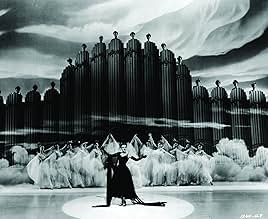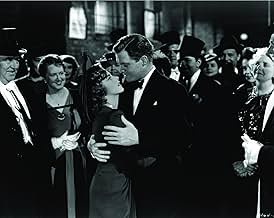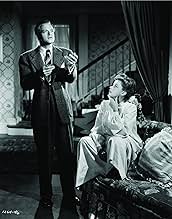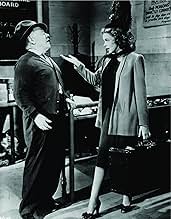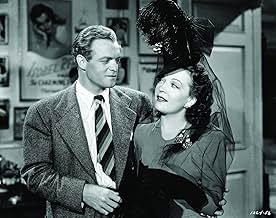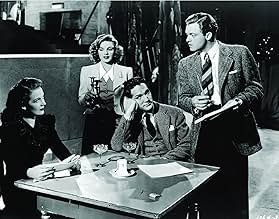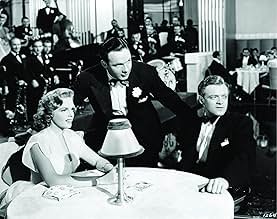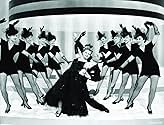Small-town Indiana girl Lily Mars dreams to be a stage actress. She begs visiting Broadway producer John Thornway for a role but he dismisses her as an amateur. She follows him to New York a... Read allSmall-town Indiana girl Lily Mars dreams to be a stage actress. She begs visiting Broadway producer John Thornway for a role but he dismisses her as an amateur. She follows him to New York and worms her way into his show, and his heart.Small-town Indiana girl Lily Mars dreams to be a stage actress. She begs visiting Broadway producer John Thornway for a role but he dismisses her as an amateur. She follows him to New York and worms her way into his show, and his heart.
- Awards
- 3 wins total
- Isobel Rekay
- (as Marta Eggerth)
- Rosie
- (as Annabelle Logan)
- Tommy Dorsey and His Orchestra
- (as Tommy Dorsey and His Orchestra)
- Bob Crosby and His Orchestra
- (as Bob Crosby and His Orchestra)
- Woman
- (unconfirmed)
- (uncredited)
- Showgirl
- (uncredited)
- Restaurant Patron
- (uncredited)
Featured reviews
I really liked Judy in this one as the girl determined to make it in the theater. Because it is Judy Garland with the talent of Judy Garland you in the audience know she has the right stuff even if it takes Van Heflin nearly the whole movie to be convinced.
Both Judy and Heflin hail from the same small town, Heflin's dad was the town doctor who delivered her and Heflin while he may have moved away and become a big producer on Broadway, their respective moms, Fay Bainter and Spring Byington have kept in touch. That's her entrée, but Heflin's constantly barraged with stagestruck kids, but never anyone quite like Lily Mars.
No real big song hits came out of Presenting Lily Mars for Garland, though she sings all her numbers. The best in the film is a revival of that gaslight era chestnut, Every Little Movement Has A Meaning All Its Own. Judy sings it with Connie Gilchrist playing the cleaning lady in a Broadway theater where Heflin's show is being produced. Gilchrist was a star back in the days of the FloraDora Girls and she and Judy deliver the song in grand style with Connie. It's the best scene in the film as Gilchrist encourages Judy to keep at it. Composer Karl Hoschna had died a long time ago, but lyricist Otto Harbach was still alive and I'm betting he liked what he heard.
European musical star Marta Eggerth is in Presenting Lily Mars as the show's star who's at first bemused, then angry and finally, understanding of Garland and Heflin. She did a couple of films with MGM and then went back to Europe for more work on the continent. I'm betting MGM didn't quite know what to do with her and her thick Hungarian accent, though Louis B. Mayer never met a soprano he didn't like.
Van Heflin does well as the patient producer who puts up with a lot from Garland and Eggerth. Heflin was just coming off his Oscar for Johnny Eager the previous year and he and Garland wouldn't appear to be an ideal screen team, but they're not bad together.
Presenting Lily Mars is a fine showcase for the talents of Judy Garland. And she didn't have to share the screen in another backstage film with Mickey Rooney.
I mean, one minute he's ready to beat her butt, but the next minute he falls in love with her. I believe that this production, the film editing, and the script ( even though the photography was great, the scenery was nice and the costumes were nice as well) could have been a little better. It feels as though the production was too rushed.
The supporting cast was good as well, especially little Janet Chapman as the second youngest daughter daughter Rosie. She at the age of 11, looks really cute and it's a shame that she didn't develop into a teenage comic actress. She's much better in this film than in her previous films as Warner Brothers in the late 1930's (except for Broadway Musketeers 1938, she's really good in that), when they tried to make her into a Shirley Temple/Sybil Jason hybrid. Overall, this film could better, but in the end, Judy gave it her all.
The tacked-on, mega-production ending is a real clunker and can leave a bad aftertaste. Avoid the ending if you can pull yourself away. But for this grandiose, ill-fitting finale, an almost perfect Garland musical and as good as she gets (which is the best singing actress ever to grace the screen).
One more point in Garland's favor: she plays the perfect "straight man" in two comic scenes with her on screen younger sister. Given Garland's reputation, let alone the instincts of any actor not to be upstaged, one can't but admire her generosity. Her self-confidence and generosity in these scenes make the film that much funnier and stronger.
1. Although the basic plot - Lily Mars (Judy Garland) goes to New York, becomes a star, and wins the heart of her director (Van Heflin) is a pretty stock Hollywood story of the period, the writers do vary the theme her a bit more than usual. Although Lily gets her big break when the star quits, she isn't successful and has to swallow her pride and go back to playing a minor role in the show.
2. Judy Garland (enough said!)
3. The supporting cast includes some really great performances. Spring Byington as Lily's mother is truely wonderful, as is Fay Bainter (the mother of the director - John Thornway (Van Heflin)). The standout supporting performance though goes to character actress Connie Gilchrist as Frankie, a one time actress turned theater custodian.
Worth a watch for sure. One of those movies that are designed to make you feel better about the world and your dreams.
Did you know
- TriviaIn the elaborate musical finale, Judy Garland is dancing with an uncredited Charles Walters, who would eventually become one of MGM's top directors and direct Judy herself in both Easter Parade (1948) and Summer Stock (1950).
- Quotes
Mrs. Thornway: John, he died several years ago.
John Thornway: Oh, he did? I'm sorry to hear that.
Mrs. Thornway: He left a wife and five children. Nobody knows how they manage, but they do. Everybody in Midhaven worries about the Marses... except the Marses.
- Crazy creditsUnder the single "The End" title, Davey Mars is seen to steal one more doorknob for his collection.
- ConnectionsFeatured in Meet Me in St. Louis: The Making of an American Classic (1994)
- SoundtracksTom, Tom, the Piper's Son
(1943) (uncredited)
Music by Burton Lane
Lyrics by E.Y. Harburg
Played during the opening credits and as background music
Sung by Judy Garland
Details
- Runtime
- 1h 44m(104 min)
- Color
- Aspect ratio
- 1.37 : 1


